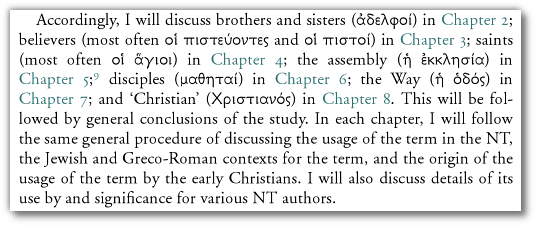OP's interest in quantifying Paul's (or, if you like, the NT's Pauline tradition) most frequently used designations for "Christians" makes for a challenging question, and one that would take a long time to deal with definitively.
Here is my best shot. Methodology: I have tabulated the figures for the thirteen NT letters in the "Pauline tradition", using the designations discussed by Paul Trebilco, Self-designations and Group Identity in the New Testament (Cambridge University Press, 2011). In his introduction (p. 3), he outlines them thus:

Here are the figures:
+----+----+----+----+---+---+
| A | B | C | D | E | F |
+-----------------+----+----+----+----+---+---+
| Romans | 13 | 5 | 9 | 6 | | 1 |
| 1 Corinthians | 27 | 22 | 7 | 3 | | |
| 2 Corinthians | 7 | 9 | 5 | | | |
| Galatians | 10 | 3 | | 1 | | |
| Ephesians | 1 | 9 | 11 | 1 | 1 | |
| Philippians | 8 | 2 | 2 | | | |
| Colossians | 2 | 4 | 6 | | 1 | 1 |
| 1 Thessalonians | 17 | 2 | 1 | 3 | | |
| 2 Thessalonians | 7 | 2 | 1 | | | |
| 1 Timothy | 3 | 3 | 1 | | 5 | |
| 2 Timothy | 2 | | | | 1 | 1 |
| Titus | | | | | 1 | 1 |
| Philemon | | 1 | 2 | | | |
+-----------------+----+----+----+----+---+---+
| TOTAL | 97 | 62 | 45 | 14 | 9 | 4 |
+-----------------+----+----+----+----+---+---+
Legend
A - brothers and sisters (ἀδελφοί)
B - assembly (ἐκκλησία)
C - saints (ἅγιοι)
D - believers (πιστεύοντες)
E - believers (πιστοί)
F - elect (ἐκλεκτός) n.b. NOT one of Trebilco's terms
n.b. - blanks = 0
Notes: (obvioulsy) arranged left-to-right in order of decreasing frequency. I have included the 0's (blanks) to make clear the comparison. But I have omitted the following:
- disciples (μαθηταί);
- way (ὁδός); and
- christians (Χριστιανός).
as they are all "zeroes" for these thirteen books. Trebilco (it will be noted) combines the categories I have separated out as "D" and "E", as the distribution seemed interesting here between the Catholic and Pastoral epistles. There is some element of "judgment call" in D/E, so those interested should do the search/concordance work for themselves.
Do consult Trebilco's substantial book for further information. A bit of additional relevant bibliography:
There is, of course, much more, but hopefully this responds adequately to OP's interest.
